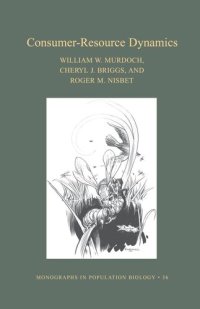
Ebook: Consumer-Resource Dynamics (MPB-36)
- Series: Monographs in Population Biology, 36
- Year: 2013
- Publisher: Princeton University Press
- Edition: Course Book
- Language: English
- pdf
Despite often violent fluctuations in nature, species extinction is rare. California red scale, a potentially devastating pest of citrus, has been suppressed for fifty years in California to extremely low yet stable densities by its controlling parasitoid. Some larch budmoth populations undergo extreme cycles; others never cycle. In Consumer-Resource Dynamics, William Murdoch, Cherie Briggs, and Roger Nisbet use these and numerous other biological examples to lay the groundwork for a unifying theory applicable to predator-prey, parasitoid-host, and other consumer-resource interactions. Throughout, the focus is on how the properties of real organisms affect population dynamics.
The core of the book synthesizes and extends the authors' own models involving insect parasitoids and their hosts, and explores in depth how consumer species compete for a dynamic resource. The emerging general consumer-resource theory accounts for how consumers respond to differences among individuals in the resource population. From here the authors move to other models of consumer-resource dynamics and population dynamics in general. Consideration of empirical examples, key concepts, and a necessary review of simple models is followed by examination of spatial processes affecting dynamics, and of implications for biological control of pest organisms. The book establishes the coherence and broad applicability of consumer-resource theory and connects it to single-species dynamics. It closes by stressing the theory's value as a hierarchy of models that allows both generality and testability in the field.